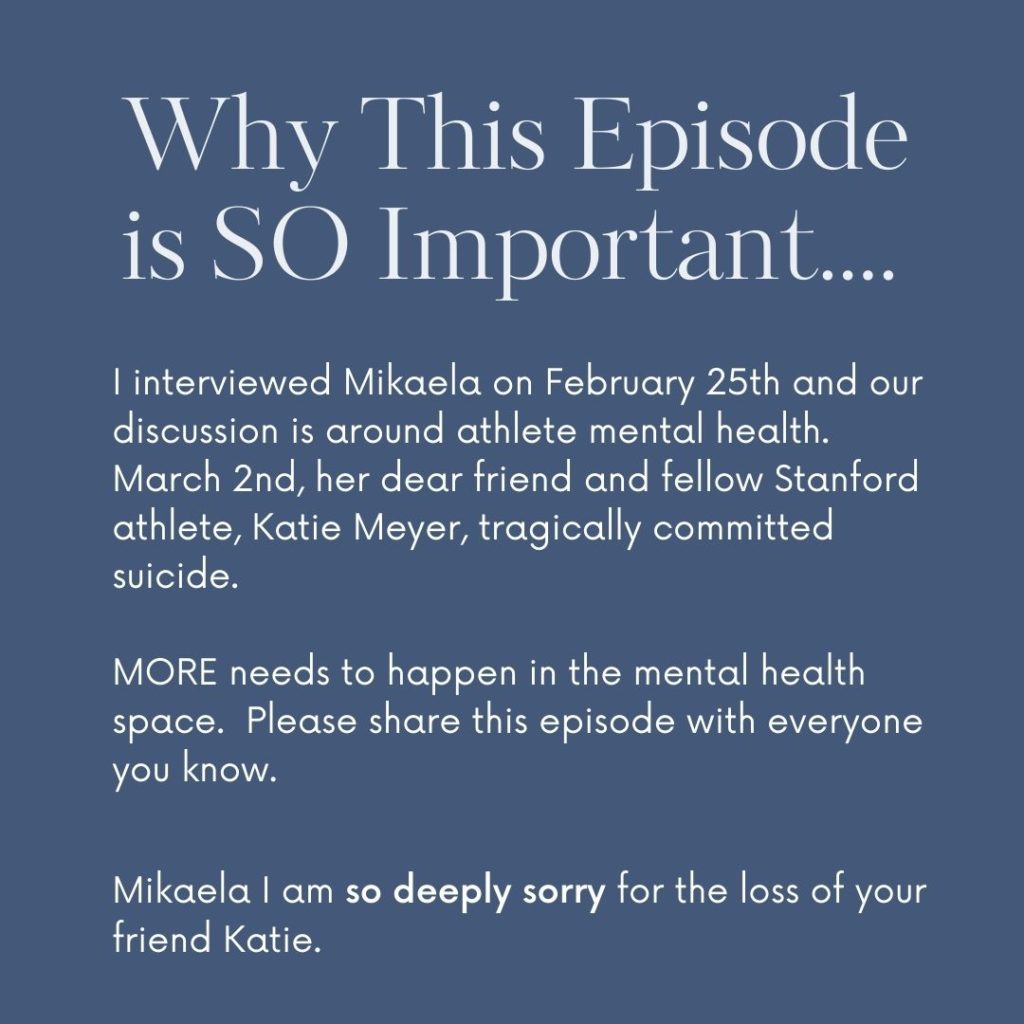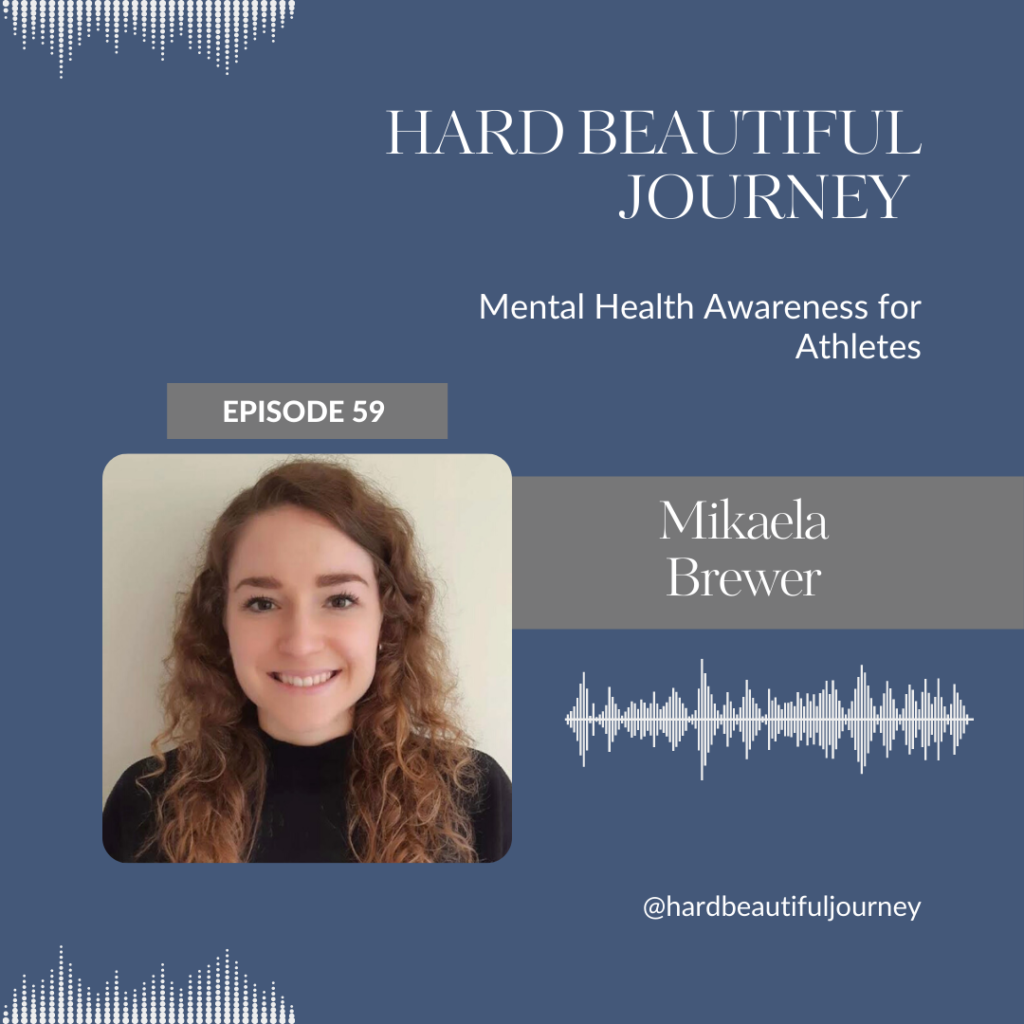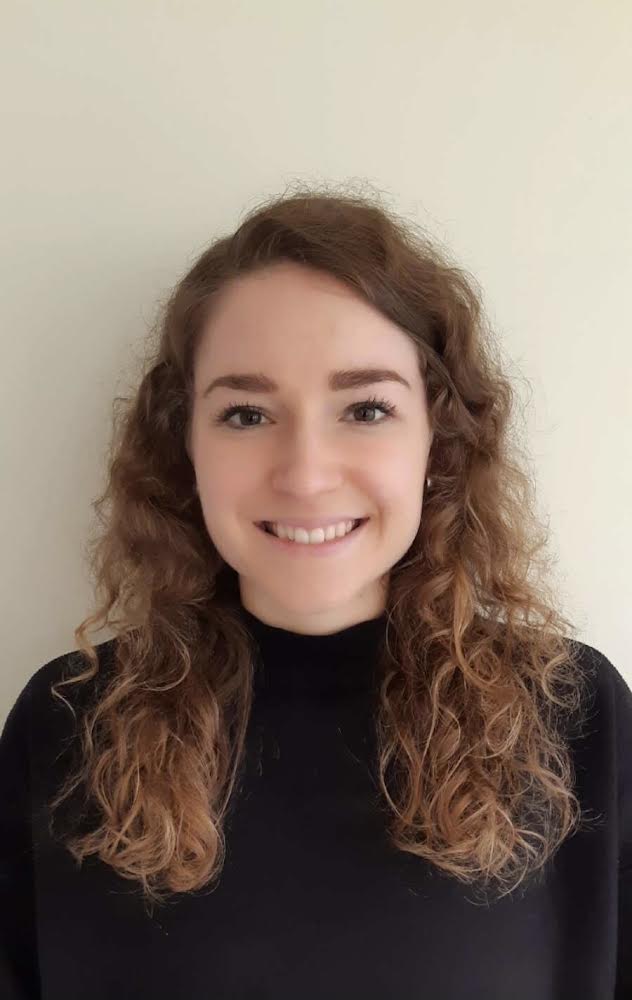Today I welcome Mikaela Brewer who openly shares her journey as a high-performance athlete and how it brought her immense joy and complex challenges.
**A gentle warning, this episode discusses suicide. If you are feeling vulnerable in this area, please consult with a doctor or mental health professional in your area. Or call one of the Suicide Prevention numbers listed in the resources.**
Mikaela Brewer is a writer, speaker, researcher, mental health advocate, and the author of The Sifting Project, her first novel. She is also a proud Stanford Women’s Basketball alumnae and a former member of Team Canada.
Alongside a good cup of coffee, Mikaela lives for research and writing projects that capture her curiosity. A multi-disciplinary writer, she has written poetry, fiction, neuroscience and sports psychology research, news, op-eds, and features for various platforms and organizations.
Mikaela believes in the voice of change, unique to stories, and the way fiction feels like people’s lyrics. These beliefs are braided into the backbone of The Sifting Project, a story that seeks to challenge beliefs, motivate and comfort.
Here are three reasons why you should listen to the full episode:
- Mikaela discusses the mental health challenges that young athletes face.
- She shares about her struggles with OCD, depression and her attempted suicide.
- As a mental health advocate, she discusses the importance of finding the language for young athletes to verbalize their mental health challenges.

Episode Highlights
Who is Mikaela Brewer
- Mikaela is a proud Stanford Women’s Basketball alumnae and a former member of Team Canada.
- She is a writer, speaker, researcher, mental health advocate, and author of The Sifting Project.
- She passionately explores the intersection of biology and storytelling as she learns to live alongside mental illness.
Her passion for basketball
- Running track was Mikaela’s first sport.
- At the age of 8, she fell in love with basketball and being a part of a team versus an individual sport.
- In high school, she realized she was really good as she started getting a lot of attention.
- She ended up playing for Team Canada and was recruited by Stanford.
Her love for writing
- Mikaela has been discovering her passion outside of sport.
- She has loved writing for a long time, and when the pandemic hit, she had the opportunity to focus on her writing as she couldn’t play basketball or go to the gym.
- Her writing expanded during this time, and she wrote her first book.
Being a high-performance athlete
- There are many similarities in how high-performance athletes at US universities are depicted in movies.
- There is a lot of pressure as athletes are expected to perform all the time and for everybody else.
- Mikaela says it’s very complicated as physical well-being gets placed as a higher priority than the athlete’s mental well-being.
Athletes and their mental health
- Some statistics point towards the struggles that young athletes face.
- The love for the sport can coexist with mental health challenges, so it’s very complicated.
- From experience, Mikaela says that mental health is sacrificed in many ways.

Struggling with OCD
- Since a young age, Mikaela has struggled with OCD.
- This ramped up as a teenager and was further impacted by her family.
- Going to Stanford on the other side of the continent, she hoped she could escape and start over.
- But she learned that it travels with you, no matter your environment.
Mikaela’s attempted suicide
- While Stanford was a new environment, Mikaela didn’t know many people.
- There was a lot of pressure to perform, and she placed high expectations on herself.
- Things spiraled out of control, and Mikaela slipped into a really deep, dark depression.
- She didn’t have the language to verbalize what she was going through, and it was not something she was taught.
- This led to her attempted suicide in February 2017.

Losing her counselor to suicide
- The counselor who helped Mikaela out of her darkness ended up committing suicide.
- It’s still something she is grappling with as she’s felt a sense of guilt.
- Mental health care providers are placed on a pedestal because they help others and know all about crisis intervention.
- However, they are not immune to mental health struggles just because they’re considered experts.
Her science fiction novel
- It was not her intention to write a science fiction novel.
- In her senior year at Stanford, Mikaela wrote her first draft in a novel writing-intensive class.
- The assignment was to write 50,000 words, and it didn’t need to be good or well organized. Its only job was to exist.
- Mikaela played around with many ideas, and it just fell into a science fiction novel, which she says is reflective of life in many ways.
Being a multi-disciplinary writer
- Mikaela works for a software company that focuses on athletes’ mental health and continues to write for this community.
- While she doesn’t do fiction as much, she has written poetry, neuroscience, and sports psychology research, news, op-eds, and features for various platforms and organizations.
Not having the words
- People who can package their mental health story in a podcast or book are celebrated and put on a pedestal by society.
- Many people can’t find the words to express what they’re going through, and they’re left behind.
- Mikaela says you’re never on the other side of the bridge when it comes to mental illness, it’s a journey, and some days are better or worse than others.
- There needs to be better resources for mental health care on a day-to-day basis.
The mental health space
- For the longest time, when it comes to crisis response, the only support has been the police and calling 911.
- This is problematic as many people choose suicide over 911.
- Mikaela works with Reach Out Response Network and develops qualified teams to respond.
- She imagines a world where people can call for help, and there’ll be someone who will know what you need even if you can’t find the words or package anything together.
Finding the language
- Schools need a wake-up call where children are taught the language of saying that they’re not okay and be applauded for it.
- It needs to be normalized.
Help for young athletes
- There’s been a lot of programming put in place for student-athletes, like focus groups and how to start conversations.
- There’s a lot less on the action side of things, like what can be done when mental health struggle comes up in conversations.
- You can teach student-athletes to be vulnerable, but unless coaches and administrators come on board, nothing is going to change.
What next for Mikaela
- Things are up in the air for Mikaela right now, which she says is a fun yet a scary place to be.
- Her primary focus is Timeout, a mental health software company for athletes.
- They’re building applications that will open up communication lines for mental health care for athletes.
- They’re targeting institutions and universities with the ultimate goal of saving lives.
An app for athletes
- It’s two applications, one for the care team and one for the athletes themselves.
- The student-athlete app will communicate with the care team to address emergencies, and students can access resources.
- There will be a constant safety net, and communication lines will be clear and accessible.
What Mikaela is grateful for
- Mikaela is home and is grateful that she gets to spend time with her sisters.
3 Powerful Quotes from this Episode
06:39 – “But I think there’s also a very complicated side of this where, you know, athletes are put on a pedestal and expected, you know, to perform all the time and perform for everybody else. And that gets placed at a higher priority than mental and physical well-being. And that’s the tricky part because there is a lot of hype and excitement. And that’s an amazing part of the experience. But athletes very quickly can equate that with their self-worth”.
16:45 – “… We want to put the people who can do that, who can package their words well, onto a pedestal and say, like, this is an example of what mental toughness is. And this is an example of how you get to the other side of a bridge. Even the people who can package the words well and do a podcast or write a book, they’re never really on the other side of, you know, the bridge of mental illness and living with it. They’re always kind of somewhere in between. And some days, you’re further towards the start line, then you are at the finish line. And that’s okay. But we don’t inherently value that as a society. And that’s what’s tricky. And I think it comes down to like, you know, what’s available for crisis support”.
19:29 – “…I work a little bit with the Reach Out Response Network, which is in Toronto, developing those teams and who’s going to be on those teams who are more qualified actually to respond. And I mean, imagine a world where, you know, you could make that phone call and know that somebody was going to respond to your needs, who knew what you needed, and knew that it was okay. And we’re going to validate that it’s okay that you don’t have words and you can’t package anything together at that moment”.
Resources
As a warning, this episode discusses suicide, so if you are feeling vulnerable in this area, please consult with a doctor or mental health professional in your area. Or call one of the Suicide Prevention numbers below.
Distress Center – 24-hour crisis line 403-266 – HELP (4357)
Crisis Services Canada – text or call – 833-456-4566 or text 45645
National Suicide Prevention Lifeline (in the US) : 1-800-273-8255
Connect with Mikaela Brewer
Hoops, Mental Health and Sharing Stories
Enjoying the Hard Beautiful Journey podcast?
Click here to follow on Apple Podcasts. While there, please leave a 5-star rating and review; it would mean so much to me! Also, if you haven’t done so already, join the Hard Beautiful Journey community to connect with other like-minded people.
I would love to connect with you on socials, so please give me a follow on:
Hard Beautiful Journey Website
Thanks for listening,
Tiff
Leave a Reply Cancel reply
This site uses Akismet to reduce spam. Learn how your comment data is processed.

add a comment
+ show comments